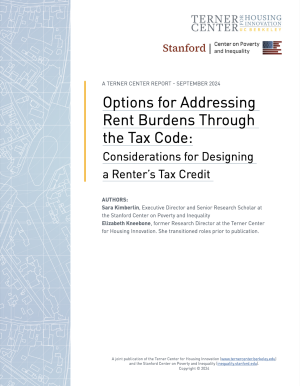With a record number of renters facing unaffordable rent burdens, policy stakeholders are pursuing a range of solutions to help renters meet their housing needs. A renter's tax credit offers one potentially promising approach, using the tax code to deliver subsidies directly to tenants. This research report lays out the decisions and tradeoffs that policymakers need to consider as they advance efforts to create or expand renter's tax credit policies. Published by Stanford CPI in collaboration with the UC Berkeley Terner Center for Housing Innovation, the report lays out how different policy options – such as whether the credit is universal or targeted, refundable or non-refundable, or pegged to income or housing cost burden – will influence who benefits, and where possible, illustrates the different effects of these decisions for renters in California.
- Read the report (2024): Options for Addressing Rent Burdens Through the Tax Code: Considerations for Designing a Renter’s Tax Credit
- Read the Terner Center blog post (2024): A Renter's Tax Credit: Improving Affordability through the Tax Code
- Watch a recording of the webinar held on Tuesday, September 24, 2024, via the Terner Center

